Wet dog odors aren’t something you want to bring home from the lake, river or a day on the beach with your pup. Of course, pet owners want their fur babies to enjoy getting wet and wild in the water with the rest of the family, so how do you keep that bad smell from setting into your sweet babies’ fur?
Excellent pet health is important to keep your dog adventuring on the water with you. Find out what causes that musty smell after swimming, and how to prevent your furry friend from holding onto foul odors to prevent health problems.
Why Does Swimming Make Your Dog Smell Musty?
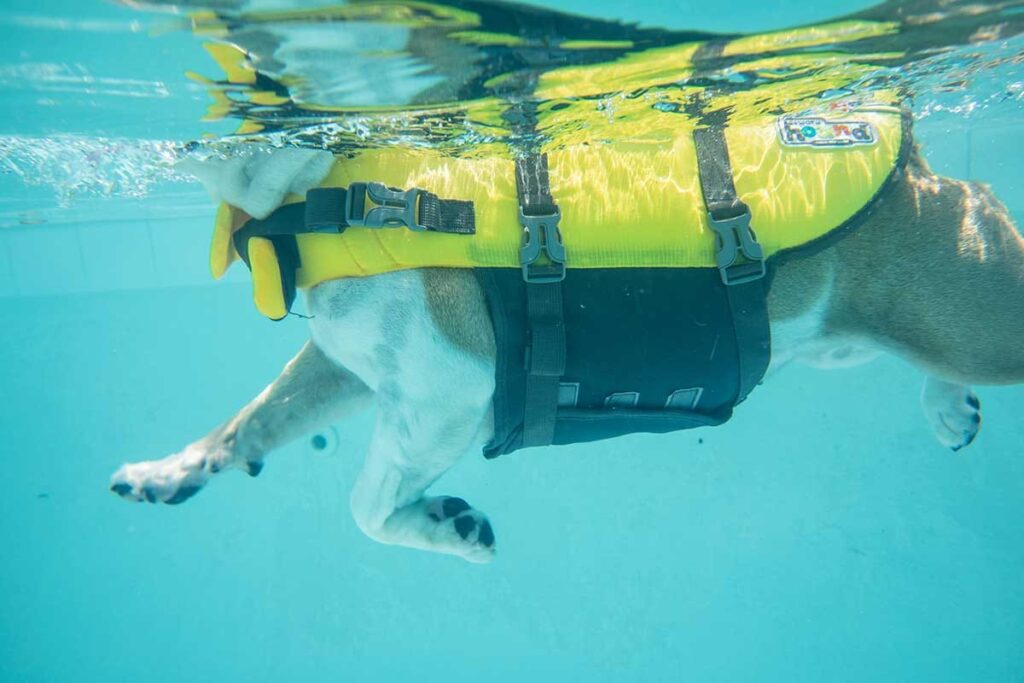
Strap on the doggie life jackets and get ready to dive in!
Believe it or not, a thick coat of fur is actually a benefit for dogs who love to swim or splash around the shore. The secretion of natural oils—especially in long-haired dogs—repels more water away from their skin, helping them dry faster and serving as a protective layer for their skin in cold water.
Those gorgeous, thick coats can unfortunately also trap bacteria or other organic materials found in water sources, leaving your dog with a lingering unpleasant odor. Imbalances between good bacteria and bad bacteria can also cause infections that not only cause your pooch to put off a seriously stinky smell, but can also be harmful to their overall wellness.
Reasons Your Dog May Smell Musty After Swimming:
- Algae
- Animal/fish waste
- Pollutants
- Plant materials, dirt, and sand
- Skin issues
Your dog’s skin and coat are home to countless microorganisms, but the buildup of overgrowth of bacteria can cause health problems like skin infections and other issues you don’t want your poor doggy to have to deal with.
Common Skin Issues That Can Come From Swimming:
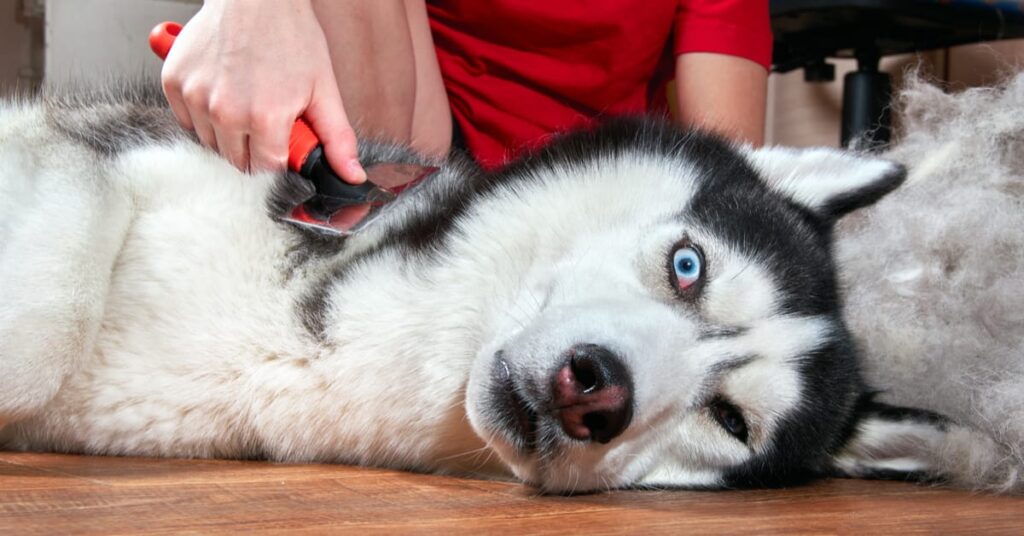
- Dermatitis
- Seborrhea
- Yeast infections
- Ear infections
- Urinary tract infections
- Other bacterial infections
Swimming in the outdoors isn’t the only place dogs can pick up a bit of a smelly scent. The chlorine and other chemicals in pools can strip the natural oils in your dog’s fur, causing dryness, itchiness, or irritation that can lead to infection. If you notice your dog scratching excessively, contact your veterinarian to have your pup checked.
Skin infections left untreated for long periods of time can not only cause serious odors, but can also lead to more serious health problems in dogs, including dental disease, periodontal disease, kidney disease, and even the heart condition DVM (dilated cardiomyopathy).
How to Prevent Your Dog From Being Smelly After Swimming
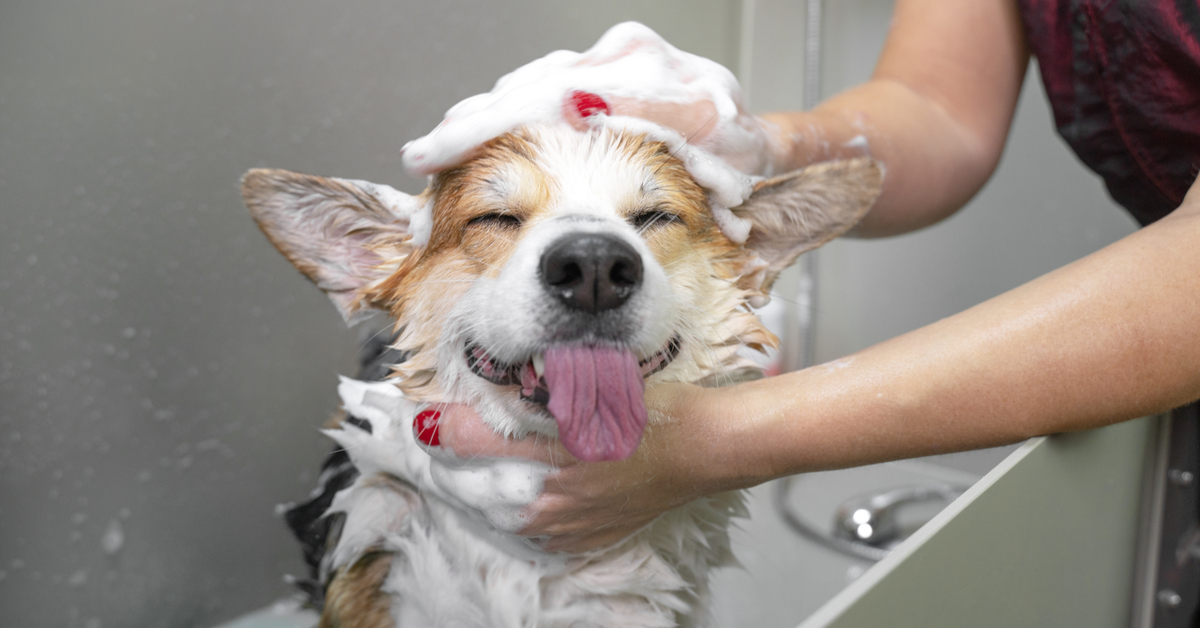
All wet dogs will have some smell to them, but there are a few ways to maintain your dog’s health and wellness after swimming. Here’s how to remove or reduce bad smells that may cause skin conditions or other health problems.
1. Give Your Dog A Bath Or Shower After Swimming
Make sure you wash well with appropriate dog shampoo. Don’t forget those nooks and crannies under the skin folds of breeds like shar peis, pugs, and bulldogs.
Using a hose or a shower head with a direct nozzle, spray your dog down well from head to tail. This way the clean water can easily work its way through your dog’s fur and remove materials that can cause foul odors and skin infections.
2. Consider Keeping Your Dog’s Coat Trimmed
Grooming is a great way to prevent the buildup of smells in your dog’s fur in the first place. If your dog is always in the water or out on the boat with you, it may be worth a regular visit to the groomer to keep their fluff in check—especially for dogs with extra thick coats like golden retrievers, collies, and Saint Bernards.
3. Brush Out Your Dog’s Coat Frequently
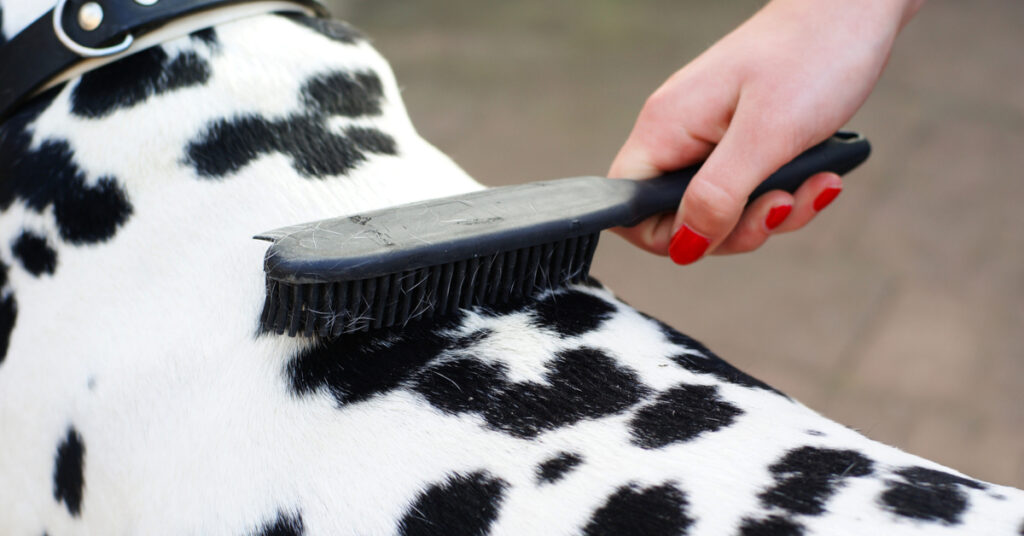
Brushing your dog’s coat often will keep it extra healthy and shiny, and flush out any loose fur, dead skin, dirt, or bacteria that may be trapped in the layers waiting to become a nuisance to your pup. Combing these little nasties out of your dog’s fur helps rid them of knots and tangles, and reduces odors and bacteria by eliminating places for them to cling to.
4. Make Sure Your Dog Is Totally Dry After Swimming Or Bathing
When your dog’s coat stays damp, this creates the perfect environment for bacteria to thrive and lead to potential health problems. Use a thick, absorbent towel (or two…or three…) or even a hairdryer if you’ve got a pooch with significantly extra fluff.
Getting your dog’s ears dry is also important to keep them healthy. With such astute hearing, it’s no wonder dogs’ ears are incredibly sensitive. Water or bacteria can easily irritate the ear canal, causing serious discomfort and potential ear infections. After swimming or bathing, dry your dog’s ears well, but gently, with a towel to prevent the ear canal from staying damp.
5. Try A Pet Deodorizing Spray
If you can’t give your pup a bath right away after swimming but still want to do something to reduce that wet dog smell, try using a pet deodorizing spray. Make sure you choose one that’s safe and gentle and made specifically for pets. Sprays that are tasteless and odorless are best to keep from bothering your furry friend.
Apply the deodorizer directly to your dog’s coat after getting them as dry as possible, and fluff it through to mask those offensive odors that can hang onto the fur.
What If Your Dog Smells Even After A Bath?
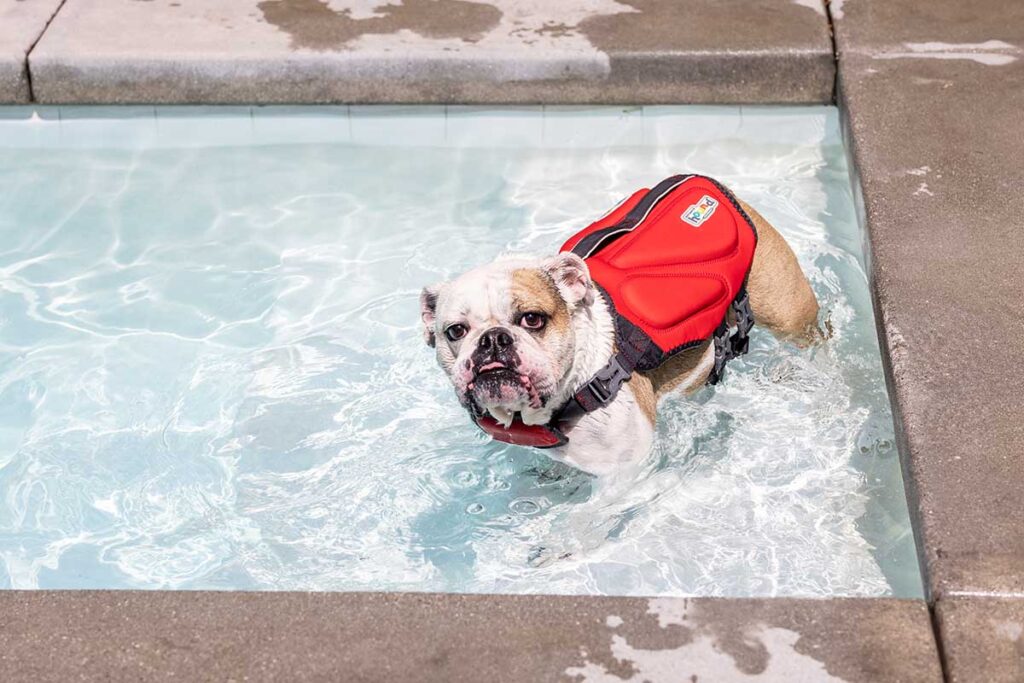
There are a few reasons there might still be a bit of stink after giving your dog a bath. One of the most common is moisture remaining in their coat. Getting your dog completely dry after a bath is the number one way to keep them smelling as clean as you know they are. If you think your dog may be suffering from more than just being stinky, consult your veterinarian right away.
Continuing to be smelly after a bath can also be a sign of something more serious, and could indicate an allergic reaction to something, or a bacterial, viral, or fungal infection. If you notice your dog itching, scratching, or licking more than normal after a bath, ask your vet for their opinion.
Safety First!
Don’t forget to equip your pup with a life vest for safety around bodies of water.

Granby Splash Dog Life Jacket
The Outward Hound Granby Dog Life Jacket is a high-performance dog flotation device for boating, water sports, the beach, the pool, and other water adventures with dogs. A front neck float adds extra support to help them keep their head above water. Top grab handles provide an easy way to retrieve your dog in an emergency. Adjustable straps keep them secure both in and out of water. For small dogs, sizes…

Dawson Swim Dog Life Jacket
The Outward Hound Dawson Dog Life Jacket is a high-performance dog flotation device for boating, water sports, the beach, the pool, and other water adventures with dogs. Designed with novice swimmers in mind, the neoprene side panels of this dog life vest will keep your dog safe by providing them with comfortable buoyancy and thermal insulation for chilly days on the water. A front neck float adds extra…
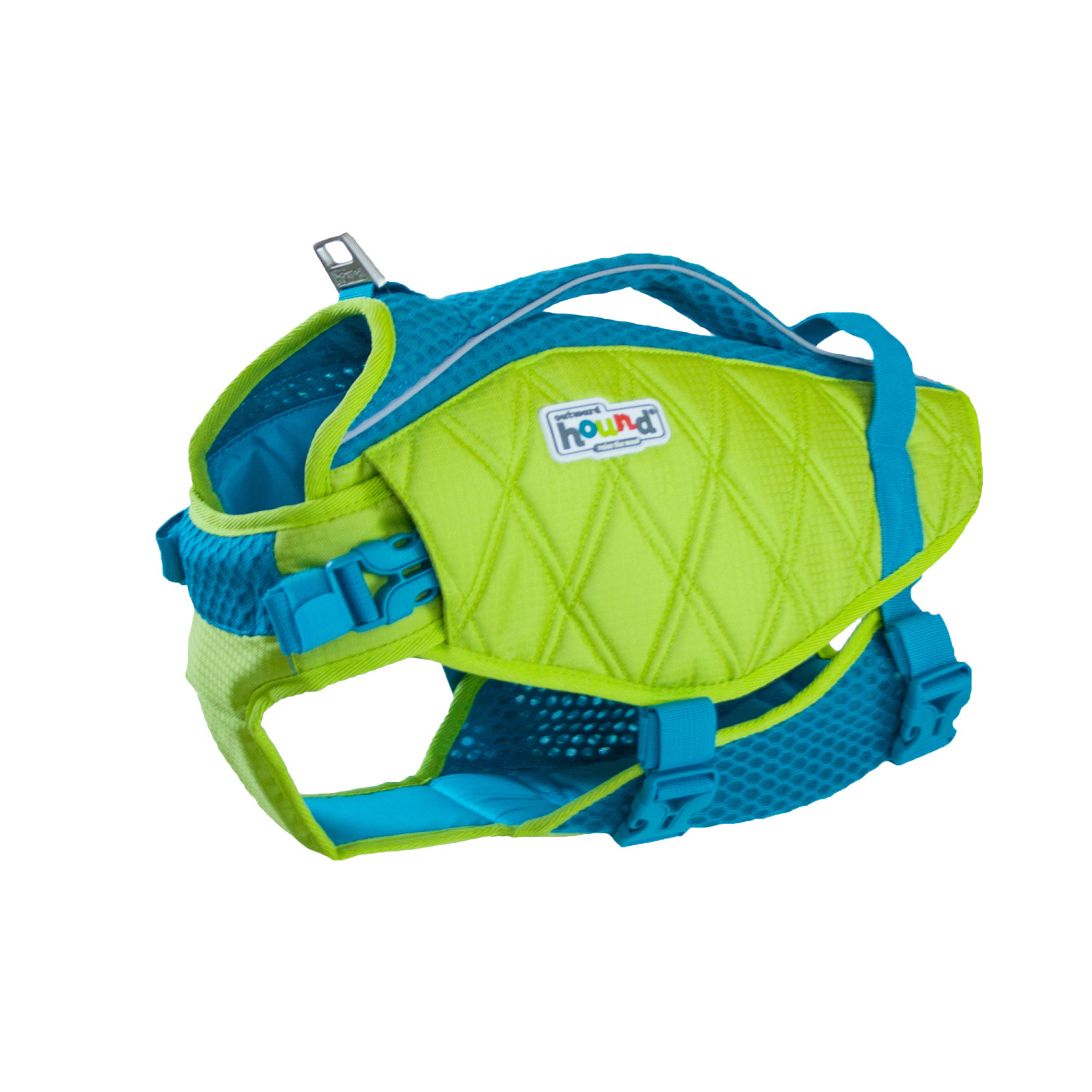
Standley Sport Performance Dog Life Jacket
The Standley Sport Performance Dog Life Jacket by Outward Hound is a high-performance dog flotation device perfect for boating, swimming, and other water sport adventures with your pup. While it’s designed for experienced swimmers in mind, this dog life vest is suitable for all levels. Sizes XS-small have one top grab handle for easy retrieval, while sizes medium-XL have a dual rescue handle design to…
 Chewy
Chewy
